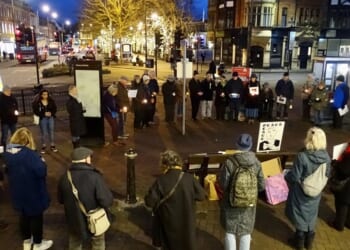PANENTHEISTIC beliefs are present among Christian climate advocates and activists, new research suggests. Survey respondents tended to agree that “God is embodied in the world and universe, rather than separate from it.”
The finding appears in Religion, Theology and Climate Change, the report of a three-year study funded by the Arts and Humanities Research Council and hosted at the University of Manchester.
The team, led by the Revd Professor Peter Scott, director of the Lincoln Theological Institute at Manchester, carried out research with six organisations: CAFOD, Christian Climate Action, Operation Noah, the RC diocese of Salford, and the C of E dioceses of Manchester and Oxford. The task was “to provide evidence of creativity in theology, going beyond dominant traditions” in the various groups.
The project included participant observation, a survey of the six groups (gathering 319 responses between May and August 2023), and 62 in-depth interviews, to investigate “ecotheological beliefs”, emotions, influences, and views in relation to taking climate action. “Significant theological creativity” was evident, the report says.
The survey used a “theologically informed questionnaire” to understand respondents’ theological views and feelings concerning climate change, alongside their attitudes towards the justification of different kinds of climate action. Respondents were asked to indicate their level of agreement with various statements, from 0 (disagree) to 10 (strongly agree). The overall average was 8.
The statement that “God is embodied in the world and universe, rather than separate from it”, described as “an explicit form of panentheism”, secured a score of 8.2. “These ideas bring a sense of immanence to creation, and when the world is viewed as imbued with the divine, such views seem to inspire a theocentric outlook that values the world for its divine presence,” the report says. The belief that God “is in everything” was “commonly reported by respondents”. One respondent commented: “If I put my hand on a tree, it’s alive with the life of God.”
This view was “not univocal”, the report says, “and the idea of creation revealing God, rather than God being within creation, made for an important contrast for some people”.
The statement “Humans have dominion over God’s creation” had a score of 4.3. Two statements — “The entire creation, not just human beings, is in the image of God” (7.3) and “The earth is alive and its creatures have freedom and autonomy” (7.1) — are described as “quite outside the mainstream of Christian thought”, with the degree of support expressed “somewhat surprising”.
The “core claim” of the report is that “climate change will only be morally considerable for Christians if it is also soteriologically considerable. . . we have found the persistent and creative effort to relate aspects of climate change advocacy and activism to soteriology.” Among its 12 recommendations is the adoption of “a broader soteriological language for engaging people”, including “expanding a soteriological language that brings Christ into the work of creation care”.
It continues: “The incarnation has been related by our respondents to creation, and God’s valuing of creation is seen as an outcome of such incarnational presence. The ministry of Jesus is appealed to by those who wish to amplify the prophetic theme in Christian witness and testimony in the context of climate change: Jesus is presented as a disruptive and controversial figure.
“Crucifixion is referred to when parallels are drawn between the crucifying of Jesus and the current ‘crucifying’ of creation. Resurrection identifies the victory of life over death, and this is developed in ecological ways to indicate a future for the non-human creation. Hope is based in the expected return of Jesus and thereby the fulfilled establishment of God’s kingdom of justice and peace.”
Two roles were identified within the six groups: “Climate stewards”, focused on lifestyles and organisational practice, and “climate prophets”, engaged in systemic critique and political activism. One Operation Noah respondent commented: “I think if Jesus was alive, as a human man, in this day and age, he would be definitely shouting about the injustice in the climate crisis and he would be calling action against quite a few organisations or banks.”
Across all groups, 39 per cent of respondents supported occupying land or buildings, 25 per cent disrupting transport systems, and 17 per cent interrupting energy supplies. More than two-thirds of respondents (68 per cent) were over-55s, including 77 per cent of those from Christian Climate Action. In total, only five per cent were under-34s.
Recommendations include conducting internal theological audits, using the questionnaire used to inform the study.
The report is available at: pure.manchester.ac.uk

















